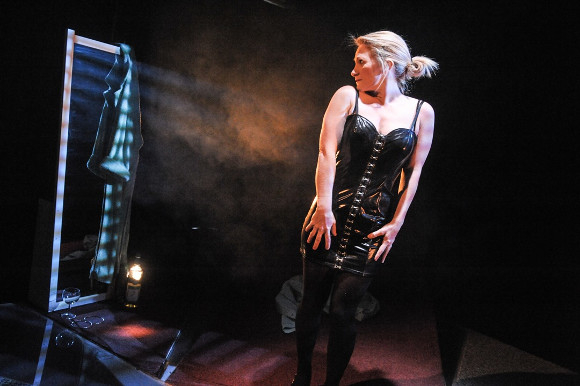Amateur Girl (St James Theatre)

There are no dramatic surprises in this solo turn by Lucy Speed. From the outset we know the arc through which she will travel, from "That’s all it is – a bit of fun", to picking up the pieces of her life after she’s unceremoniously discarded by the guy who’s lured her into the sex industry. She is Julie, a geriatric nurse and Take That fan, who just wants "to help people". That this concept doesn’t appear to be taken to ludicrous lengths in the search for a social message is a mark of the quality of the piece.
The dramatic impetus resides in how far Julie’s naiveté will allow her to go without losing all her self-esteem. In lesser hands than Speed’s, and writer Amanda Whittington’s, this 70-minute play could have proved predictable and underwhelming, but here we have a very acute script, based on conversations with real "amateur girls", and a performance that is utterly convincing.
Whatever new low she succumbs to, Julie has a remarkable resilience and inner warmth. Speed shows us all the stages of self-justification, and of decency being cast off like the various items of clothing she is compelled to wear. She trusts her married "boyfriend" Gary (who only exists as a remembered voice, as does the Matron at the hospital) and she allows her trust to continue because she desperately wants to believe in him. And in herself. She wants to believe in the mirage of wealth and comfort that a life peddling sex can bring her. After all, she’s single and, as she freely admits, she "likes sex". When she finally turns on Gary and accuses him of cheating her, he chucks her without a further thought.
The most poignant moment of all comes when she is reduced to asking him for money to pay her phone bill and he humiliates her in a way that only a true sleazebag can. This is tough stuff, but the skill of the piece is that you never for one moment doubt that this is happening to countless women all over the country, who are reduced to selling something of themselves in order to pay the bills. And every one of them probably has a bit of Julie in them: the guilelessness, the hope against hope, or the belief that just one more punter can’t do any harm.
Kate Chapman’s direction brings out every nuance of character and Speed takes us into Julie’s world from the moment she comes home from a 12-hour shift in the dementia ward and calls to her deaf cat, Lulu. Julie just wants to be liked for the person she is, not for what she does, and we can only hope that she achieves this modest aim. Whether or not she does would be too churlish to reveal.










